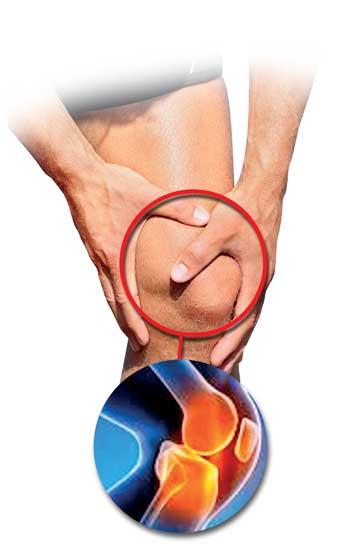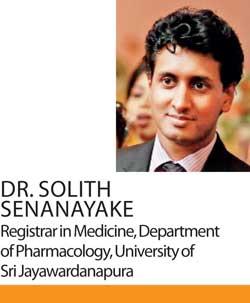Reply To:
Name - Reply Comment
 Have you come across your grandmother or grandfather complaining about a crackling sound in the knee with pain during movement? Have you noticed that this pain has been worsening over time and he or she prefers to be bed-bound rather than move around to avoid pain? If so this discussion we had with Dr. Solith Senanayake, Registrar in Medicine, Department of Pharmacology, University of Sri Jayawardanapura is for you to read to know what that condition could possibly be due to. He also provided information on how to proceed with the right medical advice in order to provide your loved ones with a quality life.
Have you come across your grandmother or grandfather complaining about a crackling sound in the knee with pain during movement? Have you noticed that this pain has been worsening over time and he or she prefers to be bed-bound rather than move around to avoid pain? If so this discussion we had with Dr. Solith Senanayake, Registrar in Medicine, Department of Pharmacology, University of Sri Jayawardanapura is for you to read to know what that condition could possibly be due to. He also provided information on how to proceed with the right medical advice in order to provide your loved ones with a quality life.
“Well, Osteoarthritis among the elderly is not a very uncommon occurrence and most of the time patients will give you a self-diagnosis of arthritis” states Dr. Senanayake.
The condition rarely occurs in people younger than 40 years of age, but at least 80% of people over 55 years of age have some X-ray evidence of the disorder without causing much of symptoms
It is all about friction, wearing and tearing off
Arthritis is the swelling or inflammation of joints. Osteoarthritis is the commonest form of arthritis which often affects the elderly, causing symptoms in hands, knees, and hips.
The end of two bones which meet each other has a covering which is the cartilage. This is more like a rubbery material which allows the two bones to slide over each other with less friction and smooth mobility. But with the development of Osteoarthritis this covering starts wearing off and the joint space is narrowed causing the two bones to rub on each other. This ultimately results in pain, swelling and restriction of the movement.
Risk factors for Osteoarthritis include, ‘advancing age’which is one of the strongest risk factors for Osteoarthritis. The condition rarely occurs in people younger than 40 years of age, but at least 80% of people over 55 years of age have some X-ray evidence of the disorder without causing much of symptoms.
“However, not every elderly person is vulnerable to develop osteoarthritis as there are several other contributory factors on top”.
For unknown reasons women are 2-3 times more likely than men to develop osteoarthritis. They are more likely to have pain during the disease progression, ‘obesity’, ‘occupation’, where osteoarthritis of the knee is linked to certain occupations which require frequent squatting and kneeling like in carpentry.
“Furthermore, substantial joint injury or trauma to a specific joint increases the risk of Osteoarthritis in that joint in the future” says Dr.Senanayake.
“In fact, the risk is increased in people who participate incertain sports including wrestling, boxing, pitching in baseball, cycling, gymnastics, soccer and football,” he added.
Symptoms
The main symptom of Osteoarthritis is joint pain which worsens with activity and relieves on rest. In severe cases, the pain may also occur at rest or at night and may be referred to other areas as well. “For example, a person with Osteoarthritis of the hip may feel pain in the lower thigh or at the knee, and a person with knee OA may feel pain in the upper shin”
Morning stiffness can also be seen in most of the individuals and usually resolves well within 30 minutes of the onset, but may recur throughout the day during periods of inactivity.

Joint effusion with fluid accumulated inside the joint capsule is a common occurrence in patients with Osteoarthritis where the affected joint will look swollen and red.
Crackling or grating sensation (crepitus) happens due to roughening of the normally smooth surfaces inside the joint. Changes take place in the joint shape especially when small joints in the hands are affected.
“Early diagnosis of Osteoarthritis and right treatment will definitely slow down the progression of degeneration thus ensuring an optimal quality of life” underscored Dr.Senanayake.
He further mentioned that osteoarthritis is mainly a clinical diagnosis even though X-rays are occasionally done when the person’s symptoms are atypical. As far as the conservative management of Osteoarthritis is concerned, resting for few minutes when the pain is worse, losing weight, physiotherapy and exercise, using supportive devices like shoe inserts, splints, canes, walkers to keep the joints stable or take weight off them, using hot or cold packs play a major role.
Herbs, vitamins, or supplements
“Although there is no strong evidence that supplements or vitamins improve arthritis symptoms, glucosamine and chondroitin can be tried out with medical advice and some clinicians would prefer this due to the placebo effect it carries”.
Anti-inflammatory pills
Medication for Osteoarthritis mainly target on managing the pain and include pills as well as anti-inflammatory creams or gels. In severe cases, injections can be given into the joint to relieve pain temporarily. “We have come across many patients who rely on over the counter pain-killers (Morphine) which they often self-prescribe and it is important to know that these drugs are not recommended for long-term relief of joint pain at all and may give rise to various unwanted side-effects” stated Dr.Senanayake.
Surgery
When neither of these treatment work, joint replacement surgery, where the damaged joint is replaced with an artificial joint can be considered depending on the severity of the condition. Patients should be in the best possible physical condition and should be ready to commit to rehabilitation after surgery. “Exercise and physical therapy are mandatory before and after the surgery to accelerate recovery and increase the chances of having good results” highlights Dr.Senanayake.
Take home message
Pain and stiffness of joints which you tend to think as osteoarthritis might be an early stage of an inflammatory arthritis where different modalities of treatment should be initiated, so always seek medical advice without jumping in to conclusions just because your neighbour or a relative with similar symptoms was diagnosed with Osteoarthritis.